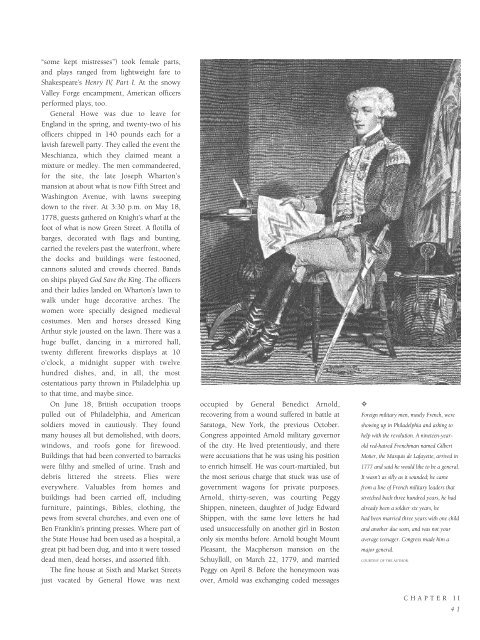Historic Philadelphia
An illustrated history of the city of Philadelphia, paired with the histories of companies, families and organizations that make the region great.
An illustrated history of the city of Philadelphia, paired with the histories of companies, families and organizations that make the region great.
You also want an ePaper? Increase the reach of your titles
YUMPU automatically turns print PDFs into web optimized ePapers that Google loves.
“some kept mistresses”) took female parts,<br />
and plays ranged from lightweight fare to<br />
Shakespeare’s Henry IV, Part I. At the snowy<br />
Valley Forge encampment, American officers<br />
performed plays, too.<br />
General Howe was due to leave for<br />
England in the spring, and twenty-two of his<br />
officers chipped in 140 pounds each for a<br />
lavish farewell party. They called the event the<br />
Meschianza, which they claimed meant a<br />
mixture or medley. The men commandeered,<br />
for the site, the late Joseph Wharton’s<br />
mansion at about what is now Fifth Street and<br />
Washington Avenue, with lawns sweeping<br />
down to the river. At 3:30 p.m. on May 18,<br />
1778, guests gathered on Knight’s wharf at the<br />
foot of what is now Green Street. A flotilla of<br />
barges, decorated with flags and bunting,<br />
carried the revelers past the waterfront, where<br />
the docks and buildings were festooned,<br />
cannons saluted and crowds cheered. Bands<br />
on ships played God Save the King. The officers<br />
and their ladies landed on Wharton’s lawn to<br />
walk under huge decorative arches. The<br />
women wore specially designed medieval<br />
costumes. Men and horses dressed King<br />
Arthur style jousted on the lawn. There was a<br />
huge buffet, dancing in a mirrored hall,<br />
twenty different fireworks displays at 10<br />
o’clock, a midnight supper with twelve<br />
hundred dishes, and, in all, the most<br />
ostentatious party thrown in <strong>Philadelphia</strong> up<br />
to that time, and maybe since.<br />
On June 18, British occupation troops<br />
pulled out of <strong>Philadelphia</strong>, and American<br />
soldiers moved in cautiously. They found<br />
many houses all but demolished, with doors,<br />
windows, and roofs gone for firewood.<br />
Buildings that had been converted to barracks<br />
were filthy and smelled of urine. Trash and<br />
debris littered the streets. Flies were<br />
everywhere. Valuables from homes and<br />
buildings had been carried off, including<br />
furniture, paintings, Bibles, clothing, the<br />
pews from several churches, and even one of<br />
Ben Franklin’s printing presses. Where part of<br />
the State House had been used as a hospital, a<br />
great pit had been dug, and into it were tossed<br />
dead men, dead horses, and assorted filth.<br />
The fine house at Sixth and Market Streets<br />
just vacated by General Howe was next<br />
occupied by General Benedict Arnold,<br />
recovering from a wound suffered in battle at<br />
Saratoga, New York, the previous October.<br />
Congress appointed Arnold military governor<br />
of the city. He lived pretentiously, and there<br />
were accusations that he was using his position<br />
to enrich himself. He was court-martialed, but<br />
the most serious charge that stuck was use of<br />
government wagons for private purposes.<br />
Arnold, thirty-seven, was courting Peggy<br />
Shippen, nineteen, daughter of Judge Edward<br />
Shippen, with the same love letters he had<br />
used unsuccessfully on another girl in Boston<br />
only six months before. Arnold bought Mount<br />
Pleasant, the Macpherson mansion on the<br />
Schuylkill, on March 22, 1779, and married<br />
Peggy on April 8. Before the honeymoon was<br />
over, Arnold was exchanging coded messages<br />
✧<br />
Foreign military men, mostly French, were<br />
showing up in <strong>Philadelphia</strong> and asking to<br />
help with the revolution. A nineteen-yearold<br />
red-haired Frenchman named Gilbert<br />
Motier, the Marquis de Lafayette, arrived in<br />
1777 and said he would like to be a general.<br />
It wasn’t as silly as it sounded; he came<br />
from a line of French military leaders that<br />
stretched back three hundred years, he had<br />
already been a soldier six years, he<br />
had been married three years with one child<br />
and another due soon, and was not your<br />
average teenager. Congress made him a<br />
major general.<br />
COURTESY OF THE AUTHOR.<br />
CHAPTER II<br />
41
















